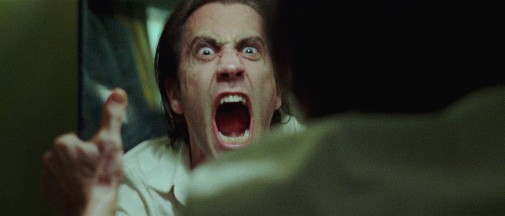
For the past decade or so, Jake Gyllenhaal has been on the cusp of a second Oscar nomination. At least, that's what it seems like when one takes a look at his career. Instead of coasting by on his good looks and innate charisma, Gyllenhaal is always up for a challenge, be it a physical transformation or some unlikely feat of tonal somersaulting. Still, regardless of critical acclaim, that second nod remains elusive with 2014's Nightcrawler being the closest the actor ever came to reconquering the good graces of AMPAS...
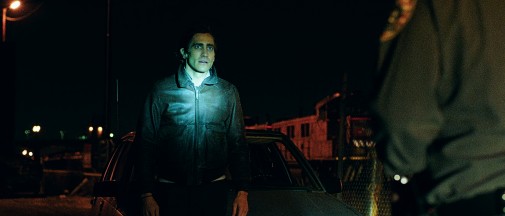
In Dan Gilroy's directorial debut, Jake Gyllenhaal plays Louis "Lou" Bloom, a con man with no scruples, a huckster with vampiric ambition. We meet him in the darkness of a Los Angeles night, trespassing when he's confronted by a security guard with a nice watch. As a flashlight illuminates his face, what we see isn't the usual beauty we tend to associate with this actor, but a gaunt mask with bugged-out eyes and a hyperactive mouth always ready to slash a fake smile across the face. This is no matinée idol, but a ghoul who pounces on his prey the minute he gets the chance, stealing the guard's watch along the way.
What follows is Lou's nightly routine, a sales pitch to rid himself of stolen wares and the act of hunting for a new job. The owner of the scrap yard he approaches is wise enough to see through this sociopath's grinning façade. Unlike other, more unfortunate people later in the story, he refuses Lou's offer. That moment, when his would-be employer looks away from Lou after denying him a job, is one of Gyllenhaal's most chilling scenes. His face practically melts off the skull, losing all affectation in a moment of genuine fury. Before we know it, the salesman's smile is back in place, but the harm is done. We've already seen the monster.
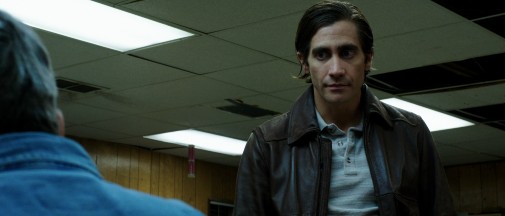
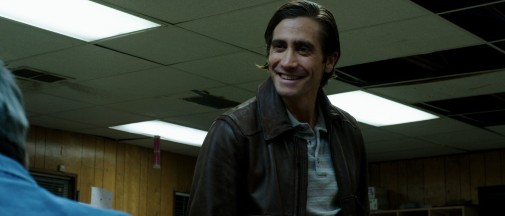
Throughout Nightcrawler, the audience grows used to seeing Lou putting on a show of manic professionalism. Because of that, when he temporarily lets the mask slip, it's startling and unnerving, akin to the vision of a snake with a human face. Such occurrence and the denial of a new job are no step-back in Lou's professional plans, however. Before the night is over, he finds a new vocation in the business of recording gruesome accidents and bloody crime scenes for local news stations. The scent of tragedy compels him like blood attracts a hound.
And, just like that, he becomes a nightcrawler, a freelance photojournalist who traverses through the city in search of some lurid imagery. A vulture making money out of pain, Lou becomes acquainted with a ruthless news director, played by a never-better Rene Russo, and starts a perilous relationship of coerced intimacy and mutual amorality. He also hires an underpaid underling in the form of Riz Ahmed's Rick, the only main character in the entire film with a shred of decency. Things don't end well for him, as you might imagine.
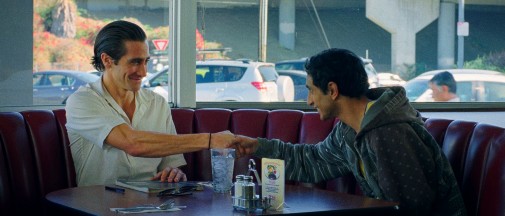
The gist of the story is Taxi Driver meets Network, a screed against the bloodthirsty sensationalism of the media made through the character study of an irredeemable individual. Not that Lou is ever as relatable as Robert DeNiro's nihilistic Travis Bickle or Faye Dunaway's ferocious Diana Christensen. No matter how ignoble those creatures of New Hollywood Cinema may have been, they still came off as human. Lou Bloom, on the other hand, is never human but more like a mythic figure. He's the ideal of the self-made man stripped of capitalistic glamour to reveal the self-made monster underneath.
Fittingly, Gyllenhaal performs the Lou as some sort of reptilian manifestation of primordial evil, all unblinking stares, mad curiosity, and beastly hunger.
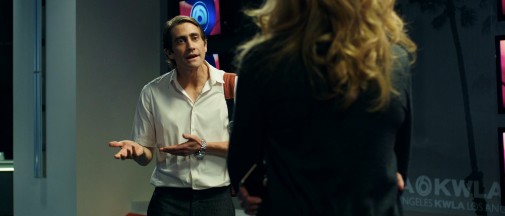
Mechanically, the performance is a wonder of craftsmanship, the suggestion of inner pestilence through showy actorly tricks. First and foremost, there's that piercing gaze, two beacons of carnivorous curiosity always shining from the depths of Gyllenhaal's skull. Moreover, he never seems to react organically to his scene partners, disrespecting their personal space with naked aggression, and speaking over them whenever he can. As for the mouth that shapes Lou's vile words, it's an excited line of grotesque mushiness, contorting in exaggerated shapes that never seem truthful to the character's interiority.
Only rarely does he allow his entire face to catch up with Lou's clipped speech, which is overly articulated and methodical. In some regards, he sounds like an even more robotic and virulent version of Ben Shapiro. Lou often smiles with his mouth to punctuate words, but he rarely smiles with his eyes. When he does so, it's worse, for Lou's sincere glee is a demonic thing while his fake grins are a mere facsimile of human expression. The feeble attempt at personhood is still more comforting than the open void that is Lou Bloom.
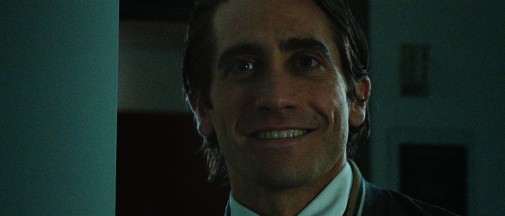
In 2014, Jake Gyllenhaal got nominated for everything but the Oscar. He received the Globe, BAFTA, Critics Choice, and SAG nominations, but AMPAS ignored him in favor of five other men. Eddie Redmayne in The Theory of Everything won the Oscar and, going into nomination morning, he was pretty much locked alongside Michael Keaton in Birdman and Benedict Cumberbatch in The Imitation Game. Steve Carrell got plenty of precursor attention for Foxcatcher, though some of his gold came in the form of Best Supporting Actor nods. As for Bradley Cooper, American Sniper got little precursor buzz, in part because of its late December release. However, huge box office and critical acclaim upon its opening propelled the Clint Eastwood flick to surge at the right time to hit big with the Academy. In the end, Cooper's success was Gyllenhaal's demise.
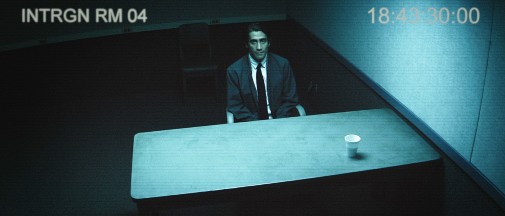
Nightcrawler is newly available to stream on Netflix. You can also rent it from Amazon, Google Play, Youtube, and others.